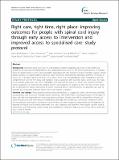| dc.contributor.author | Middleton, James M | en_US |
| dc.contributor.author | Sharwood, Lisa N | en_US |
| dc.contributor.author | Cameron, Peter | en_US |
| dc.contributor.author | Middleton, Paul M | en_US |
| dc.contributor.author | Harrison, James E | en_US |
| dc.contributor.author | Brown, Doug | en_US |
| dc.contributor.author | McClure, Rod | en_US |
| dc.contributor.author | Smith, Karen | en_US |
| dc.contributor.author | Muecke, Sandy | en_US |
| dc.contributor.author | Healy, Sarah | en_US |
| dc.date.accessioned | 2015-01-05T18:26:50Z | |
| dc.date.issued | 2014 | en_US |
| dc.identifier.citation | Middleton, James M, Lisa N Sharwood, Peter Cameron, Paul M Middleton, James E Harrison, Doug Brown, Rod McClure, Karen Smith, Sandy Muecke, and Sarah Healy. 2014. “Right care, right time, right place: improving outcomes for people with spinal cord injury through early access to intervention and improved access to specialised care: study protocol.” BMC Health Services Research 14 (1): 600. doi:10.1186/s12913-014-0600-7. http://dx.doi.org/10.1186/s12913-014-0600-7. | en |
| dc.identifier.issn | 1472-6963 | en |
| dc.identifier.uri | http://nrs.harvard.edu/urn-3:HUL.InstRepos:13581089 | |
| dc.description.abstract | Background: Traumatic spinal cord injury is a devastating condition impacting adversely on the health and wellbeing, functioning and independence, social participation and quality of life of the injured person. In Australia, there are approximately 15 new cases per million population per year; economic burden estimates suggest 2 billion dollars annually. For optimal patient outcomes expert consensus recommends expeditious transfer (“<24 hours of injury”) to a specialist Spinal Cord Injury Unit, where there is an interdisciplinary team equipped to provide comprehensive care for the many and complex issues associated with traumatic spinal cord injury. No study of this patient population has been undertaken, that assessed the extent to which care received reflected clinical guidelines, or examined the patient journey and outcomes in relation to this. The aims of this study are to describe the nature and timing of events occurring before commencement of specialist care, and to quantify the association between these events and patient outcomes. Methods and design The proposed observational study will recruit a prospective cohort over two years, identified at participating sites across two Australian states; Victoria and New South Wales. Included participants will be aged 16 years and older and diagnosed with a traumatic spinal cord injury. Detailed data will be collected from the point of injury through acute care and subacute rehabilitation, discharge from hospital and community reintegration. Items will include date, time, location and external cause of injury; ambulance response, assessments and management; all episodes of hospital care including assessments, vital signs, diagnoses and treatment, inter-hospital transfers, surgical interventions and their timing, lengths of stay and complications. Telephone follow-up of survivors will be conducted at 6, 12 and 24 months. Discussion There is limited population level data on the effect of delayed commencement of specialist care (>24 hours) in a Spinal Cord Injury Unit. Examining current health service and clinical intervention pathways in this Australian population-based sample, in relation to their outcomes, will provide an understanding of factors associated with patient flow, resource utilisation and cost, and patient and family quality of life. Barriers to streamlined effective early-care pathways and facilitators of optimal treatment for these patients will be identified. | en |
| dc.language.iso | en_US | en |
| dc.publisher | BioMed Central | en |
| dc.relation.isversionof | doi:10.1186/s12913-014-0600-7 | en |
| dc.relation.hasversion | http://www.ncbi.nlm.nih.gov/pmc/articles/PMC4267049/pdf/ | en |
| dash.license | LAA | en_US |
| dc.subject | Acute traumatic spinal cord injury | en |
| dc.subject | Clinical pathways | en |
| dc.subject | Patient flow | en |
| dc.subject | Trauma systems | en |
| dc.subject | Access to specialist care | en |
| dc.subject | Quality of care | en |
| dc.subject | Outcomes | en |
| dc.title | Right care, right time, right place: improving outcomes for people with spinal cord injury through early access to intervention and improved access to specialised care: study protocol | en |
| dc.type | Journal Article | en_US |
| dc.description.version | Version of Record | en |
| dc.relation.journal | BMC Health Services Research | en |
| dc.date.available | 2015-01-05T18:26:50Z | |
| dc.identifier.doi | 10.1186/s12913-014-0600-7 | * |
| dash.authorsordered | false | |


